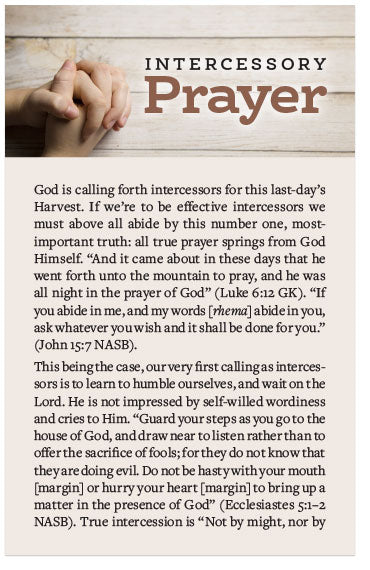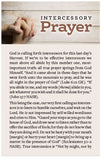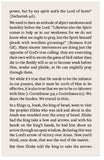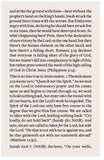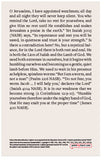Intercessory Prayer
Special-Order Folded Tract
 NOTE: This item is custom-printed to order (click for more details).
NOTE: This item is custom-printed to order (click for more details).
This tract is from our print-on-demand library, and is not kept in stock. Select the options below, and we will custom-print a batch just for you. Because this item is custom-printed, you can add your custom imprint to the back page at no extra cost.
- Estimated shipping date: Thursday, March 26 (Click for more details)
- SKU:
- Discounts: Discount coupons do not apply to this item
- Format: Folded Tract
- Size: 3.5 inches x 5.5 inches
- Pages: 4
- Imprinting: Available with 5 lines of custom text
- Returns: Because this item is custom-printed to order, it cannot be returned.
Show all item details
The full text of this tract is shown below. (Do you want to print this tract in a different version than the one listed? Contact us and let us know what you're looking for—we may be able to create the alternate version for you at no charge.)
God is calling forth intercessors for this last-day’s Harvest. If we’re to be effective intercessors we must above all abide by this number one, most-important truth: all true prayer springs from God Himself. “And it came about in these days that he went forth unto the mountain to pray, and he was all night in the prayer of God” (Luke 6:12 GK). “If you abide in me, and my words [rhema] abide in you, ask whatever you wish and it shall be done for you.” (John 15:7 NASB).
This being the case, our very first calling as intercessors is to learn to humble ourselves, and wait on the Lord. He is not impressed by self-willed wordiness and cries to Him. “Guard your steps as you go to the house of God, and draw near to listen rather than to offer the sacrifice of fools; for they do not know that they are doing evil. Do not be hasty with your mouth [margin] or hurry your heart [margin] to bring up a matter in the presence of God” (Ecclesiastes 5:1–2 NASB). True intercession is “Not by might, nor by power, but by my spirit saith the Lord of hosts” (Zechariah 4:6).
We need to have an attitude of abject meekness and humility before the Lord. “Likewise also the Spirit comes to help us in our weakness; for we do not know what we ought to pray, but the Spirit himself pleads with wordless groanings” (Romans 8:26 GK). Many sincere intercessors are doing just the opposite of God’s true calling: they are exercising their own will to storm the gates of Hell rather than die to the fleshly will so as to become weak before Him, tender and pliable, so He can mightily pray through them.
Yet while it’s true that He needs to be the initiator in our prayers, that it must be 100% of Him to be effective, it is also true that we are to be co-laborers with Him (1 Corinthians 3:9; 2 Corinthians 6:1). We share the burden. We travail in Him.
In 2 Kings 13, Joash, the king of Israel, went to visit the prophet Elisha who was sick and about to die. Joash was troubled over the army of Israel. Elisha had the king take a bow and arrows, and with his hands on the king’s hands, he had him shoot an arrow through an open window, declaring this was the Lord’s arrow of victory over Aram. Now you’d think, once done, that was the end of the matter.
But then Elisha told the king to take the arrows and strike the ground with them—here without the prophet’s hand on the King’s hands. Joash struck the ground three times with the arrows. But Elisha was angry with him, declaring he should have struck five or six times, then he would have destroyed Aram. So what’s happening here? First, there’s the declaration of sure victory by the Lord on the one hand, but then there’s the human element on the other hand, and here there’s a falling short. Romans 3:23 declares that everyone is falling short of the glory of God, but we mustn’t fall into complacency in light of this, but rather press toward the mark of the high calling of God in Christ Jesus (Philippians 3:14).
This is no less true in intercession. 1 Thessalonians 5:19 warns us to “Quench not the Spirit.” As we wait on the Lord in intercessory prayer and He comes upon us and begins to travail through us, we need to hold nothing back, but enter into the travail with all our hearts, lest the Lord’s work be impeded. The Spirit of the Lord can only have free course to the degree that we give Him free course. We are called to labor with the Lord, holding nothing back: “Cry loudly, do not hold back” (Isaiah 58:1 NASB). And note, we are not called to labor for the Lord, but with the Lord. “He that is not with me is against me, and he that gathereth not with me scattereth abroad” (Matthew 12:30).
Isaiah 62:6-7 (NASB) declares, “On your walls, O Jerusalem, I have appointed watchmen; all day and all night they will never keep silent. You who remind the Lord, take no rest for yourselves; and give Him no rest until He establishes and makes Jerusalem a praise in the earth.” Yet Isaiah 30:15 (NASB) says, “In repentance and rest you will be saved, in quietness and trust is your strength.” Is there a contradiction here? No, but a mystical balance, for in the Lord there is both rest and zeal. He is both the Lion of Judah and the Lamb of God. We need both extremes in ourselves, but it begins with humbling ourselves and becoming as a gentle, quiet lamb before Him. We need to wait in his presence as helpless, spineless worms: “But I am a worm, and not a man” (Psalm 22:6 NASB). “‘Do not fear, you worm Jacob … I will help you,’ declares the Lord” (Isaiah 41:14 NASB). It is in our weakness that we become strong (2 Corinthians 12:9-10). “Humble yourselves therefore under the mighty hand of God, that He may exalt you at the proper time” (James 4:10 NASB).

